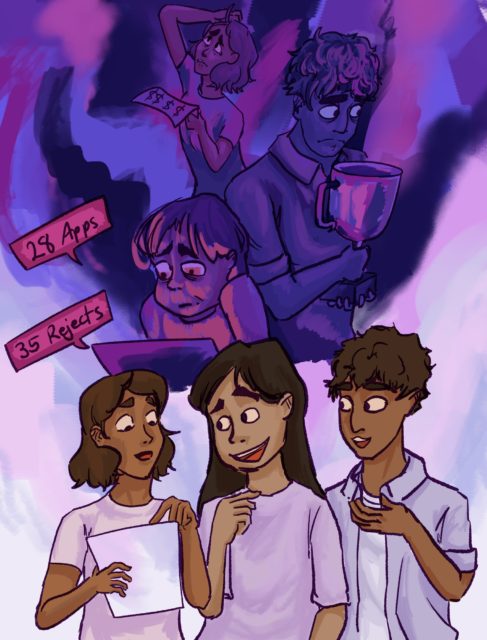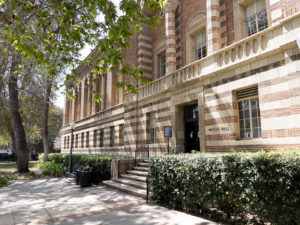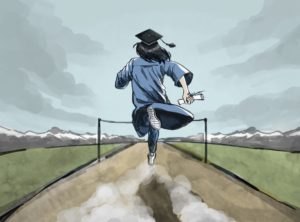To everyone who just got accepted to UCLA, congratulations.
Applying to colleges is a painful process with years of preparation, months of waiting and days and nights spent scrambling through deadlines. And now, the dust finally settles.
Perhaps you were your high school’s valedictorian, thrived in extracurriculars and had your unique personal growth experience that distinguished yourself. Or maybe you wondered if it was just a stroke of pure luck, knowing that countless qualified students vie for spots at top colleges each year.
Regardless, you made it through, and the dedication and determination that you evidently possess deserve recognition, especially at this stage of life.
Before entering college, it might have felt like life mimicked a straight line: Get into a good university and land a high-performing job.
Yet after swimming in the larger ocean of college for a year now, I can confidently say there will be moments of uncertainty. You will experience excitement and simultaneous anxiety as you navigate through numerous paths just to find that not a single one is straight.
Navigating college is a stage you’ll all take, and I want to share the unparalleled opportunities UCLA offers.
However, there are few dispiriting facts we have no choice but to confront in contemporary college life, because everyone would agree that going to college in this new millennium is challenging. Before talking about how to gain more autonomy in your college experience, it is crucial to recognize the structural challenges in college education that frustrate our generation.
If you’re an out-of-state student or an international student like me, choosing to attend UCLA is no easy choice – it’s expensive.
Even for California residents, tuition costs are often a significant concern. From 1993 to 2024, average in-state tuition at public four-year universities across the country skyrocketed by 109%, adjusted for inflation.
But has the value of a degree increased?
Unfortunately, employers suggest otherwise.
The median annual earnings for a UCLA alumnus two years after graduation is $52,406, while the living wage in California for a single adult before taxes is $56,825, according to the Massachusetts Institute of Technology’s Living Wage Calculator for California.
College often seems like the only trajectory to follow for many high school graduates. Many employers still demand a college degree. This form of gatekeeping keeps the lower- and middle-class students struggling to afford college, often ending up with tens of thousands of dollars in debt.
Another reality hits many college students early on: The job market is brutal.
UCLA students are often described as high-achieving, filling their schedules with extra classes, research labs and internships. Many have realized these efforts are necessary to maximize their chances of securing a job, getting into graduate school or succeeding in any other post-undergraduate endeavors.
To stand out as an applicant – whether for a job, research project or graduate school program – students now need more than just a degree.
This pressure puts a heavy mental burden on college students to apply early for internships and research opportunities, hurting students from modest backgrounds who might have to work late hours to maintain a steady salary to afford college.
The truth is, we are facing a bleak reality in contemporary college education.
Behind the facade of impressive resumes and attending a highly ranked university, most of my friends, from freshmen to seniors, feel anxious about what the future holds.
Some of us are not even certain about which major to study, let alone what career path to pursue.
It’s understandable to be worried about the future, but our liberty to explore freely as college students is increasingly under threat.
There’s a growing message in society that post-graduation success requires an early start. Students are pressured to choose their careers as soon as possible.
However, the purpose of an ideal college education is to make it affordable for all while providing realistic opportunities that are attainable.
Higher education is supposed to foster an environment that encourages the development of interests, personalities and ideas and helps college students succeed by investing resources in education quality.
Maybe you feel angered, maybe you think that the reality is upsetting. But the truth is, we do not have much say on many of these issues.
Here comes the part of optimism: I want to encourage each of you to keep in mind what college is supposed to offer, even when things do look stressful. Looking back on my past year, here is what I thought made my college experience so colorful.
Joining a few nonacademic or noncareer-related clubs was the best investment of my time outside of my studies. I met and collaborated with some truly amazing friends in a chamber music club, and I also had the chance to start my own club where we discuss current social issues that interest us, both of which gave me a way out to meet people and pursue my endeavors outside of my studies.
Studying is only a small portion of college life, and by getting involved in nonacademic extracurriculars, it is possible to learn far more than one would in a classroom about other students with varying backgrounds and interests.
There are also numerous opportunities to explore and connect with communities that align with your passions. For example, you can join open events, from UCLA Herb Alpert School of Music’s free concerts every week to UCLA First Thursdays, or you can support your favorite student athletes in college games, many of which are free for students to attend.
I also found myself feeling engaged and accepted by the community when I joined several protests on campus that advocated for causes I believed would serve for the better of the community.
All of these experiences helped me understand what it means to share solidarity and sympathize with another’s struggles. I am also more confident in my ability to understand different perspectives and critically reflect on problems that need to be addressed.
Life can be unpredictable, and many things can go wrong for various reasons. However, I’ve come to realize that I can use my privilege as a college student to help others around me.
I have learned how to uphold my moral principles and help others succeed as a Bruin.
In retrospect, I realized that all I may have learned from the textbooks hardly measures up to the deepest memories I formed during my college experience.
Truthfully, what lies closest to my heart is the community I am very lucky to be a part of and the relationships that have made me grow as a person.
College should not be treated as a place of mass production of employment but as a place to support creative inquiry and promote independent thinking free from indoctrination.
While we may not be in a position to change the entirety of societal views on higher education, we can shape our own college experiences by consciously choosing the kind of life we want to have.
When it feels like we are bound by our circumstances, by actively striving to seek space to explore our interests and improve our community, we can make our college experience a little bit more meaningful for each and every one of us, together.





Comments are closed.